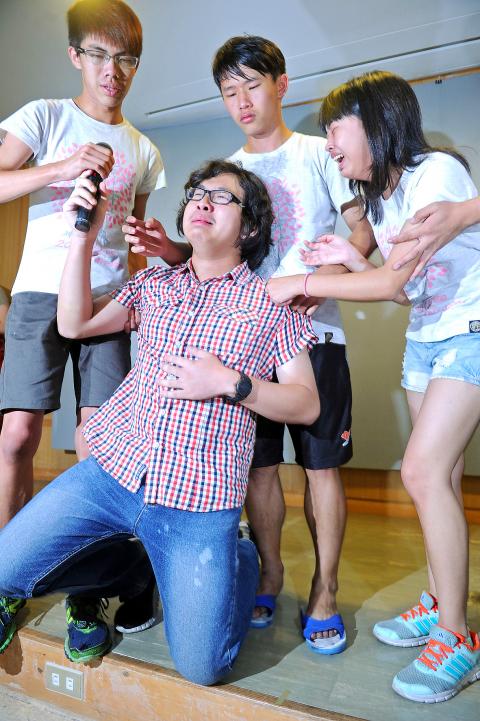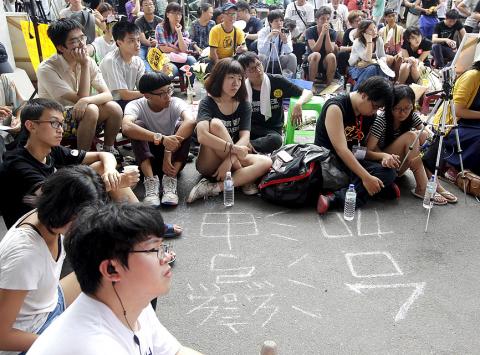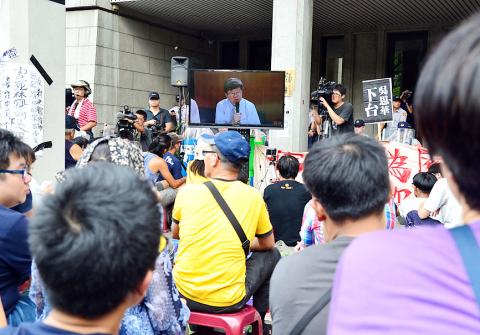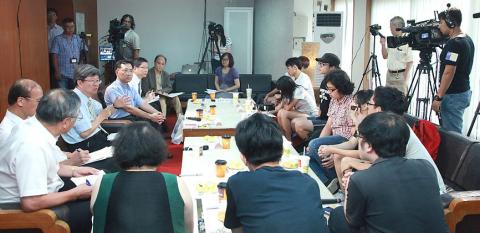Talks between Minister of Education Wu Se-hwa (吳思華) and students over the curriculum controversy fell apart yesterday, with students storming out of a Ministry of Education (MOE)-sponsored forum in tears.
“What in the world are these talks supposed to be?” Northern Taiwan Anti-Curriculum Changes Alliance convener Chu Chen (朱震) said. “What I see is a failure of education and a policy that has gradually moved away from the masses.”
“We are willing to accept a suspension of the implementation [of changes to curriculum guidelines] — all that is needed is those few words,” he said, repeatedly breaking into tears. “Only that would count as respect, without which, all we are left with, other than pain, is a hatred of the government and education.”

Photo: CNA
Wu repeated his position that it is administratively impossible for the guidelines to be withdrawn, because they have already gone into effect.
“I am truly willing to allow schools to make the decision about textbook choices. I think this is the solution to the problem,” Wu said when asked if the ministry could postpone implementation until next year.
The ministry’s policy of allowing schools to choose whether to use pre-adjustment textbooks represented the “maximum” it could do, he said, urging students to “return to school” and ask their teachers to keep using old textbooks if they disagree with guideline adjustments.

Photo: Reuters
After Wu’s rejection, Chu rushed from the meeting room in tears, shouting: “I am so sorry Dai Lin (林冠華),” referring to a student whose suicide on Thursday last week, allegedly in protest against changes to high-school curriculum guidelines, sparked the latest wave of student protests against the controversial adjustments, in which student protesters have occupied the ministry’s forecourt since Friday last week.
Chu was followed out the room by the few remaining student protesters, including Yi Juo-yu (伊若宇), who threw a badge at Wu, calling him “shameless” and promising to “look him up” later.
Prior to Chu’s outburst, most of the other students had already left the meeting in protest after Wu refused to make concessions, only to rush back and bang on the meeting door, saying that they needed to “save” Chu after he started to cry.

Photo: Wang Yi-sung, Taipei Times
In a tear-filled news conference afterward, students expressed their frustration with the ministry.
“Today is the day that Taiwan’s history and education died,” National Taichung First Senior High School Apple Tree Commune Club spokesperson Chen Chien-hsun (陳建勳) said. “All that the death of a student has gained is the education minister telling us that we should ‘look to the future.’ What is that supposed to mean?”
“Today we compromised and told the ministry that we could accept a ‘suspension’ or ‘freezing’ [of the implementation of curriculum guideline adjustments] because we are tired and we do not want anyone else to be hurt,” he said, falling to his knees as he apologized to protesters.

Photo: Liu Hsin-de, Taipei Times
Yesterday’s talks between Wu and student representatives at the National Central Library in Taipei focused on accusations of irregularities in the process under which the guidelines were adopted, with students citing the absence of academics of Taiwanese history from the review committee and the ministry’s loss in a lawsuit on procedural openness in calling for a suspension.
In response, Wu repeated previous ministry talking points, including that a Control Yuan investigation had found no problems with the procedures and that the ministry had a responsibility to protect the privacy of academics who participated in the guideline’s review committee.
Wu arrived 10 minutes late for the forum, and at one point rolled his eyes in response to comments made by National Taiwan University history professor Hua Yih-fen (花亦芬), who accompanied the students.
She told him that there would be no way to “help” him if he kept using “bureaucratic verbal tricks” and “administrative procedures” to respond to the students.
Deputy Minister of Education Lin Teng-chiao (林騰蛟) after the forum finished announced four concessionary displays of “good will” to the students, including a promise to reveal the names of members of the guideline review committee members within 10 days of asking their permission, adding an appendix on controversial terminology to the outlines, guaranteeing schools the right to select their own textbooks and initiating a “rolling review” of the review process.
He said the event was a “good start” for communication between the ministry and students, adding that the ministry was open to arranging further meetings.
Although the ministry had previously suspended implementation of the original 2009 curriculum guidelines, the current round of adjustments could not be suspended, because it had already been implemented, he said, adding that suspension would put the ministry on the line to cover the losses of publishers that have already revised textbooks.
The ministry would investigate the possibility of covering the losses of schools that wish to switch back to old textbooks, he said. Most schools had already completed the textbook selection process when the ministry announced in June that schools were free to continue using the old versions of textbooks.
At press time last night, a large crowd remained in the ministry’s courtyard, with student representatives saying that they would announce their next steps today.

MAKING WAVES: China’s maritime militia could become a nontraditional threat in war, clogging up shipping lanes to prevent US or Japanese intervention, a report said About 1,900 Chinese ships flying flags of convenience and fishing vessels that participated in China’s military exercises around Taiwan last month and in January have been listed for monitoring, Coast Guard Administration (CGA) Deputy Director-General Hsieh Ching-chin (謝慶欽) said yesterday. Following amendments to the Commercial Port Act (商港法) and the Law of Ships (船舶法) last month, the CGA can designate possible berthing areas or deny ports of call for vessels suspected of loitering around areas where undersea cables can be accessed, Oceans Affairs Council Minister Kuan Bi-ling (管碧玲) said. The list of suspected ships, originally 300, had risen to about 1,900 as

Japan’s strategic alliance with the US would collapse if Tokyo were to turn away from a conflict in Taiwan, Japanese Prime Minister Sanae Takaichi said yesterday, but distanced herself from previous comments that suggested a possible military response in such an event. Takaichi expressed her latest views on a nationally broadcast TV program late on Monday, where an opposition party leader criticized her for igniting tensions with China with the earlier remarks. Ties between Japan and China have sunk to the worst level in years after Takaichi said in November that a hypothetical Chinese attack on Taiwan could bring about a Japanese

Right-wing political scientist Laura Fernandez on Sunday won Costa Rica’s presidential election by a landslide, after promising to crack down on rising violence linked to the cocaine trade. Fernandez’s nearest rival, economist Alvaro Ramos, conceded defeat as results showed the ruling party far exceeding the threshold of 40 percent needed to avoid a runoff. With 94 percent of polling stations counted, the political heir of outgoing Costa Rican President Rodrigo Chaves had captured 48.3 percent of the vote compared with Ramos’ 33.4 percent, the Supreme Electoral Tribunal said. As soon as the first results were announced, members of Fernandez’s Sovereign People’s Party

MORE RESPONSIBILITY: Draftees would be expected to fight alongside professional soldiers, likely requiring the transformation of some training brigades into combat units The armed forces are to start incorporating new conscripts into combined arms brigades this year to enhance combat readiness, the Executive Yuan’s latest policy report said. The new policy would affect Taiwanese men entering the military for their compulsory service, which was extended to one year under reforms by then-president Tsai Ing-wen (蔡英文) in 2022. The conscripts would be trained to operate machine guns, uncrewed aerial vehicles, anti-tank guided missile launchers and Stinger air defense systems, the report said, adding that the basic training would be lengthened to eight weeks. After basic training, conscripts would be sorted into infantry battalions that would take